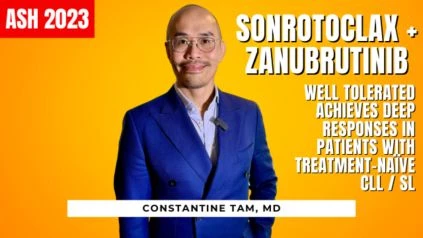In an ongoing Phase 1/2 study, Constantine Tam, MD, a researcher and Professor of Haematology, investigates a combination therapy for treatment-naïve Chronic Lymphocytic Leukemia/Small Lymphocytic Lymphoma (TN-CLL/SLL) patients. The study focuses on the safety and efficacy of combining Sonrotoclax, a second-generation BCL2 inhibitor, with Zanubrutinib, a Bruton Tyrosine Kinase (BTK) Inhibitor. Preliminary results suggest outcomes, with a focus on responses, tolerability, and safety.
The combination of Sonrotoclax and Zanubrutinib presents an advancement in the treatment landscape for TN-CLL/SLL patients. Compared to existing treatments, this combination demonstrates potential advantages, including a safety profile with manageable treatment-emergent adverse events. Dr. Tam explores aspects of this therapy, aiming to provide insight into its benefits and efficacy compared to conventional treatments for this specific patient population.
The study’s safety profile indicates manageable treatment-emergent adverse events, with attention given to the mitigation of tumor lysis syndrome (TLS) during the ramp-up schedule. Dr. Tam elaborates on the strategies employed to minimize the risk of TLS, a critical aspect of patient care. The absence of clinical or laboratory TLS in the study cohort holds significance, underscoring the success of the safety measures implemented.
Findings include an overall response rate (ORR) and achievement of undetectable minimal residual disease (uMRD4) in blood. Dr. Tam discusses how these efficacy outcomes may translate into long-term outcomes for patients with TN-CLL/SLL. Furthermore, he explores the implications of these findings and outlines considerations for the upcoming phase 3 study, emphasizing the need for further investigations to solidify therapeutic advancements observed in this phase.
This ongoing research spearheaded by Dr. Constantine Tam presents a potential avenue for advancing the treatment landscape for patients with TN-CLL/SLL, aiming for improved outcomes in the field of hematology.

